A Skull Miscellany (1)

With All Hallows coming up I thought it meet ‘n’ reet to offer this skull miscellany, poems ‘n’ stories ‘n’ assays of ghastly encounters, harrowing the bone which juggles at the interface between this and Other worlds.
Forgive me for repeating the first story again, but it is the totem story from which all the others which fascinate and move me are rooted (buried, drowned) in.
***
THE LEGEND OF ST. ORAN
Oran may may have already been on the Isle of the Druids when Columba and his 12 companions arrived in 563 A.D. to found the Abbey of Iona.
At first, the abbey construction fares badly. Each day’s work is leveled overnight by some disturbed spirit. Columba sets up a watch to observe what happens at night, but each person set to the task is found dead the next day amid the fallen timbers.
Columba decides to do the vigil himself and sits alone at the site in the howling cold dark. In the middle of the night, a great and terrible being in the shape of a half-woman, half-fish comes to Columba from the surrounding waters. Columba asks the apparition what is repelling his efforts to build at Iona and the fish-woman says she does not know, but that it would continue to happen until one of his men offered themselves to be buried alive in a grave seven times as deep as a man’s length.
Lots are cast and Oran is chosen (other accounts say he volunteered) and he lay down in the footers and was buried. No wind rises up that night to spoil the work and the construction proceeds without incident.
After three days and nights Columba became curious to know how his follower had fared and ordered him dug up. The monks excavate the spot where Oran had been sacrificed, finally uncovering his face. Oran’s eyes pop open, and staring right at Columba he declares, “There is no wonder in death, and hell is not as it is reported. In fact, the way you think it is is not the way it is at all.” Horrified, the saint had Oran buried again at all haste, crying “Uir! Uir! air beul Odhrain” or “Earth, earth on Oran’s mouth!” (The saying “chaidh uir air suil Odhrain” or “Earth went over Oran’s eye” is still widely heard in the Highlands and Hebrides.
Despite the frightful encounter, Columba dedicated the monestary’s graveyard to Oran (Reilig Odhrain) and honored Oran’s sacrifice by saying that no man may access the angels of Iona but through Oran. The bones of many Scottish, Irish and Norwegian kings were sent to Oran’s graveyard; Duncan and Macbeth are interred in the St. Oran chapel at the center of the graveyard.
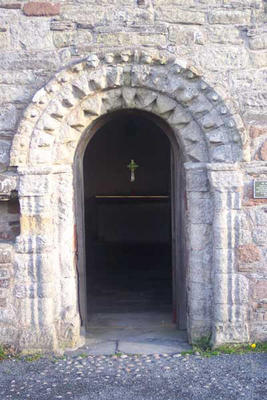
Door to St. Oran's Chapel at Iona
SKULL MUSIC
2004
My head is also Yours, rude stone,
Bone petra: A vault of verbal
Coins and blue booty, the old slush
Pile of all my days and what You
Make of them. I now believe that
Each event enfolds three cups here:
The tale, its bedding, and the dream
It opens like a door. It’s no
wonder that skulls were set in the
Lintels of barrows, and pitched down
Wells. Nor that I’ve found so many
Here. Each poem is but a tongue both
Back and forward of Your own, my
Totem father, my old stone cross.
May Your bone summit bless this toss.
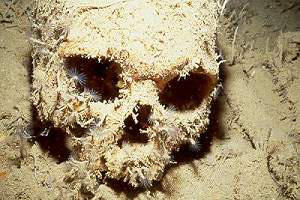
THE LEGEND OF CUMLYN LAKE
Cumlyn Lake, near the quaint village of Briton Ferry, is one of the many in Wales which are a resort of the elfin dames. It is also believed that a large town lies swallowed up there, and that the Gwragedd Annwn have turned the submerged walls to use as the superstructure of their fairy palaces. Some claim to have seen the towers of beautiful castles lifting their battlements beneath the surface of the dark waters, and fairy bells are at times heard ringing from these towers. The way the elfin dames first came to dwell there was this: A long, ay, a very long time ago, St. Patrick came over from Ireland on a visit to St. David of Wales, just to say 'Sut yr y'ch chwi?' (How d'ye do?); and as they were strolling by this lake conversing on religious topics in a friendly manner, some Welsh people who had ascertained that it was St. Patrick, and being angry at him for leaving Cambria for Erin, began to abuse him in the Welsh language, his native tongue. Of course such an insult could not go unpunished, and St. Patrick caused his villifiers to be transformed into fishes; but some of them being females, were converted into fairies instead. It is also related that the sun, on account of this insolence to so holy a man, never shed its life-giving rays upon the dark waters of this picturesque lake, except during one week of the year. This legend and these magical details are equally well accredited to various other lakes, among them Llyn Barfog, near Aberdovey, the town whose 'bells' are celebrated in immortal song.
-- Wirt Sikes, British Goblins: Welsh Folk-lore, Fairy Mythology, Lengends and Traditions, 1880
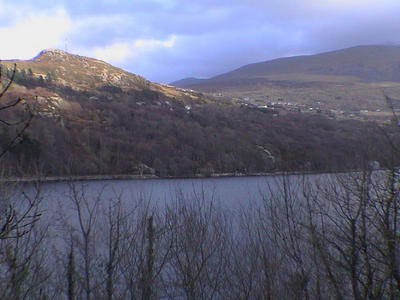
THE SORCEROUS FINFOLK
from Sigurd Towrie,
Orkneyjar: The Heritage of the Orkney Islands
The tales of Finfolkaheem, the Finfolk's ancestral home, have always described it as a true mythical paradise.
Situated at the bottom of some unknown sea, Finfolkaheem was the permanent and dearly beloved home of the Finfolk - the place they returned when the darkness of an Orkney winter drew in and the might of Teran whipped the seas up into boiling froth.
For countless generations Orcadian storytellers waxed lyrical about this fantastic undersea kingdom, describing with great zeal its massive crystal halls and ornate gardens of multi-coloured seaweed.
Lit by the phosphorescent glow of the sea, Finfolkaheem was decorated with swathes of draped curtains whose colours shifted like the ever-changing shades of the Merry Dancers - the Northern Lights or Aurora Borealis.
Towers of glistening white coral spiralled upwards, encrusted with pearls and precious gemstones. The kingdom was so rich that giant pearls were littered everywhere, often being ground up by the merfolk to provide the powder that was scattered over the mermaids' tails to give them their sparkling sheen.
In the waters surrounding Finfolkaheem, the Finfolk were said to raised sea-cattle and magical sea-horses.
Like the true gentry of their underwater world they herded whales - from which they extracted milk - and mounted on their aquatic steeds would often hunt the animals of the sea using otters in place of dogs.
When it came to splendour and grandeur, nothing else in Orkney folklore could come close to the marine haven that was Finfolkaheem.
-- Web source: http://www.orkneyjar.com/folklore/finfolk/heem.htm
THE DEVIL’S TOMB
2005
Sailors from all latitudes assure you that
there, one mile from that tragic promontory
that backs up the constant duel of the world’s
two largest oceans, at Cape Horn, the devil
is sounding with two-ton chains, which he drags,
grinding the shackles in the depths of the sea
on horrible stormy nights, when the water
and dark shadows seem to rise and fall from
the sky to those abysses.
-- Franciso Coloane, “Cape Horn,”
transl. David A. Petreman
Many sailors dare not even speak
of those hours they rose and fell
and brutallest travail out on the world’s
full dying breath in breadth of wind:
Words to that effect would raise
the very devil from his tomb
to grind those seas again, even
here at this dry succorest hour
of 4 a.m. in Central Florida
where I sit in my writing chair
in the middle of an earnest
& fragrant spring. Yet taunt and
beg and dare the sourest of
bum angels I must, to sing the
full extremity of salt derange
inside the inside of every conch
delved from deep blue seas.
I must, inside the weary labors
of the dry good life which itself
is inside the miasmals of this
dumb and dumber, excrementally
ripe age. On TV at 2:30 a.m. -- I’m
up inside the broken bell of another
migraine -- On TV the stiffened corpse
of Pope John Paul is dressed in silk
and paraded through the streets of
Rome while on a far channel some
hopeful for a Playboy centerfold
shoot flashes digitized breasts for
Howard Stern. Silk vestment and
rude thong are the north and south
ends of our continent, dead Pole’s
probiscus and pixie buttocks nailed
fast to something my angels fly
high over, winging on to wilder poles,
even more riven wood. It’s so
quiet at this hour I can hear my
wife sigh in her sleep upstairs,
and further out, cars lumbering up
441 just out of town, the hum of
streetlights weaving with air
conditioners and a lone sprinkler
a few yards out. Surely such deadly
an hour has a secret door on
further down where You, my Cape,
are bluer than the devil’s balls
on Easter morning, & rougher
than the milky hands which tossed
the stars back in the face of God.
Who knows who bid me to press
ever darker and deeper here,
at this hour and age no less,
and on this next day of a fast-fleeting life --
first father or his murderer,
Votigern or Merlin’s shade
Lilith the sea-witch or Brigid
stringing harps for the distant
hour soon to wake -- all of them,
perhaps, one dread communal slake
of ink by the ghostly pages they all
rim and shore. Who or
whatever prompts this hand
to write, I know I must harrow on
past that last wild hour here
which seemed to sing a doom
but morphed into cathedral rooms
desperately in need of the real
real rock n roll show, the one inside
my every busted labor when I
cranked it full and woke every
dragon of the fall. How far
can a poem go beyond its own,
bone-littering conceit? That’s the
mystery of the Devil’s Tomb
I sing today, a place where
sea to sea You mix and smash
to smithereens my fleet of ferried
knowns. It’s all nakedness down here,
a pass of ghastly, world-high foam,
and I know I can’t forge on without
those words for which the Pope drifts
dead through Rome and makes
the Bunny’s aurulae burns an
icy, oh-too-savage red. Is this island in
the chain a further link on down?
Have I poured enough ink on paper
as to make the very devil drown?
No way, I hear the next song croon
and howl, beyond the last line just
ahead. Not here, not quite, not ever
they sing in that arch-nasaled and
nipply abyss. Not for all the migraines
to purse and pucker the next kiss.
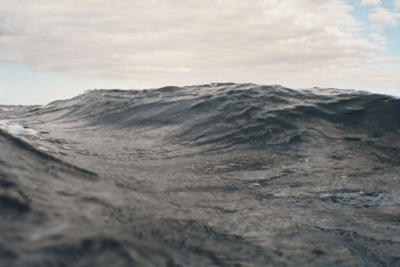
NUCKELAVEE
Nuckelavee was a monster of unmixed malignity, never willingly resting from doing evil to mankind. He was a spirit in flesh. His home was the sea; and whatever his means of transit were in that element, when he moved on land he rode a horse as terrible in aspect as himself. Some thought that rider and horse were really one, and that this was the shape of the monster. Nuckelavee's head was like a man's, only ten times larger, and his mouth projected like that of a pig, and was enormously wide. There was not a hair on the monster's body, for the very good reason that he had no skin.
If crops were blighted by sea-gust or mildew, if live stock fell over high rocks that skirt the shores, or if an epidemic raged among men, or among the lower animals, Nuckelayee was the cause of all. His breath was venom, falling like blight on vegetable, and with deadly disease on animal life. He was also blamed for long-continued droughts; for some unknown reason he had serious objections to fresh water, and was never known to visit the land during rain.
I knew an old man who was credited with having once encountered Nuckelavee, and with having made a narrow escape from the monster's clutches. This man was very reticent on the subject. However, after much higgling and persuasion, the following narrative was extracted:--
Tammas, like his namesake Tam o' Shanter, was out late one night. It was, though moonless, a fine starlit night. Tammas's road lay close by the seashore, and as he entered a part of the road that was hemmed in on one side by the sea, and on the other by a deep fresh-water loch, he saw some huge object in front of, and moving towards him. What was he to do? He was sure it was no earthly thing that was steadily coming towards him. He could not go to either side, and to turn his back to an evil thing he had heard was the most dangerous position of all; so Tammie said to himself, "The Lord be aboot me, any tak' care o' me, as I am oot on no evil intent this night!" Tammie was always regarded as rough and foolhardy.
Anyway, he determined, as the best of two evils, to face the foe, and so walked resolutely yet slowly forward. He soon discovered to his horror that the gruesome creature approaching him was no other than the dreaded Nuckelavee. The lower part of this terrible monster, as seen by Tammie, was like a great horse with flappers like fins about his legs, with a mouth as wide as a whale's, from whence came breath like steam from a brewing-kettle. He had but one eye, and that as red as fire. On him sat, or rather seemed to grow from his back, a huge man with no legs, and arms that reached nearly to the ground. His head was as big as a clue of simmons (a clue of straw ropes, generally about three feet in diameter), and this huge head kept rolling from one shoulder to the other as if it meant to tumble off. But what to Tammie appeared most horrible of all, was that the monster was skinless; this utter want of skin adding much to the terrific appearance of the creature's naked body,--the whole surface of it showing only red raw flesh, in which Tammie saw blood, black as tar, running through yellow veins, and great white sinews, thick as horse tethers, twisting, stretching, and contracting as the monster moved.
Tammie went slowly on in mortal terror, his hair on end, a cold sensation like a film of ice between his scalp and his skull, and a cold sweat bursting from every pore. But he knew it was useless to flee, and he said, if he had to die, he would rather see who killed him than die with his back to the foe. In all his terror Tammie remembered what he had heard of Nuckelavee's dislike to fresh water, and, therefore, took that side of the road nearest to the loch. The awful moment came when the lower part of the head of the monster got abreast of Tammie. The mouth of the monster yawned like a bottomless pit.
Tammie found its hot breath like fire on his face: the long arms were stretched out to seize the unhappy man. To avoid, if possible, the monster's clutch, Tammie swerved as near as he could to the loch; in doing so one of his feet went into the loch, splashing up some water on the foreleg of the monster, whereat the horse gave a snort like thunder and shied over to the other side of the road, and Tammie felt the wind of Nuckelavee's clutches as he narrowly escaped the monster's grip.
Tammie saw his opportunity, and ran with all his might; and sore need had he to run, for Nuckelavee had turned and was galloping after him, and bellowing with a sound like the roaring of the sea. In front of Tammie lay a rivulet, through which the surplus water of the loch found its way to the sea, and Tammie knew, if he could only cross the running water, he was safe; so he strained every nerve. As he reached the near bank another clutch was made at him by the long arms. Tammie made a desperate spring and reached the other side, leaving his bonnet in the monster's clutches. Nuckelavee gave a wild unearthly yell of disappointed rage as Tammie fell senseless on the safe side of the water.
--- Mr. W. Traill Dennison in the Scottish Antiquary.
THIRD ROAD
Erect no markers
on the Island of the Dead.
Ferry no man there
who has not loved
nor sailed nor
both sung and cursed God.
The high crosses
and brass bells
are a distraction
to their next work
which you can only
shore. Plant their
bodies above the
waterline with
their heads facing
west on the road
only they may travel.
Do not make camp
there but sail
before sunset. You
don’t want to hear
the wolves carving
their bone songs
from the moon.
One bite of that
oblivion and
the apple island
drowns all you
know of heaven
and hell and
God and man.
Listen, even at
this hour in your
far suburb of
modernity: the rough
spring breeze which
snarled the night with
storm betrays a
a thin cold baying.
That song strafes
the darkness with
teeth as pale and
old as the moon.
First light will surely
wash this clean
at the feet of
our Lord of Days.
But for now, a last
few lines to lick
that skulled shore
which bears no
mortality in its
wild blue roar.
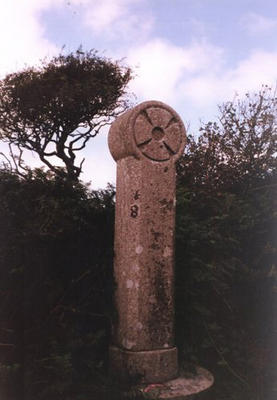

<< Home